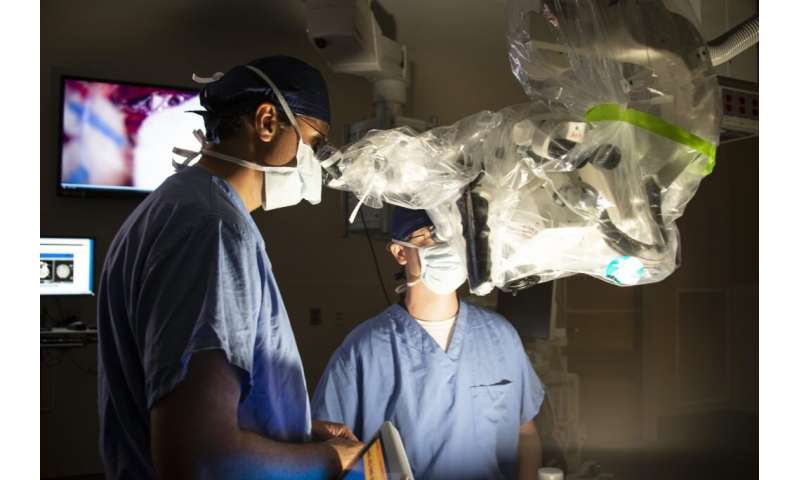
Imagine the sensation of an ice pick stabbing you in the face every time you speak, chew, brush your teeth, smile, or even when just the wind hits your face. Described as the most excruciating pain known to humanity, trigeminal neuralgia is a chronic pain condition that affects the trigeminal nerve which carries sensation from the face to the brain.
Bill thought that the pain he was originally feeling in the face was due to a problem with his teeth, but after his dentist determined it was not caused by a dental problem, his general practitioner suspected it was trigeminal neuralgia. He saw Dr. Matthew Imperioli, neurologist, and Dr. Ryan Kollar, neurology resident under Dr. Imperioli at UConn Health’s Neurology Department who confirmed this diagnosis.
It is reported that 150,000 people are diagnosed with trigeminal neuralgia every year. While the disorder can occur at any age, it is most common in people over the age of 50. There is evidence that the disorder runs in families, likely as a result of an inherited blood vessel formation. Hypertension and multiple sclerosis (MS) also are risk factors.
Pain varies, depending on the type of trigeminal neuralgia, and may range from sudden, severe, and stabbing to a more constant, aching, burning sensation. The intense flashes of pain can be triggered by vibration or contact with the cheek (such as when shaving, washing the face, or applying makeup), brushing teeth, eating, drinking, talking, or being exposed to the wind. The pain may affect a small area of the face or may spread to involve the entire face.
There is no way to know what will provoke the pain so Bill learned ways to try to avoid a trigger by watching what side of the shower hit his face, limiting certain foods that required stronger chewing, and how he brushed his teeth.
“While it was life-altering, it was not life-threatening,” says Bill. He had to miss vacations because he didn’t know when it would flair up and he had to be careful of what he was eating and drinking.
For a year and a half, Bill was on several types of pain medications, at one point taking 16 pills a day and drinking large amounts of V8 juice to compensate for the medication that significantly lowered his sodium level.
This past year the problem started to increase and the ramping up and down of pain medications became too much. He decided to seek surgical alternatives and met with Dr. Ketan Bulsara, professor, and chief of neurosurgery at UConn Health. Dr. Bulsara was trained by the pioneers who developed the microsurgical procedures for issues such as trigeminal neuralgia and is himself a recognized expert in the field.
“It is a devastating problem that drastically compromises a patient’s quality of life,” says Bulsara. “At UConn Health, through our multidisciplinary team at our cranial nerve and brainstem disorder program we see patients with these disorders routinely and we have been able to optimize patient outcomes by tailoring treatments for their specific pathology.” Dr. Bulsara co-directs the Cranial Nerve and Brainstem Disorders Program with Dr. Dan Roberts from Otolaryngology.
In late October Bill underwent a retrosigmoid craniectomy for microvascular decompression for trigeminal neuralgia through a collaborative effort of Dr. Bulsara and Dr. Roberts.
The surgery consists of an incision behind the ear followed by a craniectomy (bony opening) the size of a silver dollar, though the actual working space was probably about the size of a dime.
An offending blood vessel was found, and a Teflon pledget was placed to cushion the trigeminal nerve from the artery.
“I chose this procedure because it had the greatest success rate,” says Bill. “I’m in my 60s, in good shape and I don’t want to have to go through the process again. I chose UConn Health because of my faith in Dr. Bulsara and his team.”
Immediately after surgery, Bill for the first time was pain-free in a very long time. By the third day after surgery, he was discharged home.
“We are grateful to Bill for giving us the opportunity to care for him through our multidisciplinary team that has significant expertise in the management of these disorders,” says Dr. Bulsara.
He’s on his way to his goal to be 100% off medication and pain-free. His next step is an appointment with Imperioli and Kollar to ramp down the remainder of the medications that he is currently taking.
Source: Read Full Article
